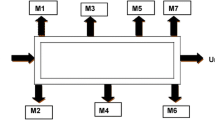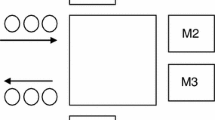Abstract
Practitioners and academicians throughout the world recognize the crucial role played by flexibility within manufacturing organizations, especially those engaged in small batch manufacture. However, although the concept of flexibility has begun to attract increased attention, its interaction with information integration and automation has not captured due attention. For example, it almost always has been assumed that a real-time control mechanism is available for exploiting routing flexibility on the shop floor. While this may be true for FMSs, it generally is not so for the vast majority of conventional manufacturing systems with varying levels of information integration and automation. The lack of a fully integrated and automated control mechanism within such semi-automated flexible manufacturing systems (SAFMSs) would eventually cause delays in the availability of shop status information. In this paper, we study the impact that defined modes of information delay have on the performance of a hypothetical SAFMS through detailed simulation experiments. Given that the level of routing flexibility is a controllable design parameter, our interest is in determining the impact that information delays have on decisions pertaining to the selection of appropriate levels of routing flexibility. To highlight the impact of information delays within the SAFMS, the Taguchi experimental design procedure is adopted as a performance evaluation and analysis vehicle, using makespan as a measure of performance. Simulation results indicate the presence of a system specific tolerance limit, operation below which minimizes performance loss.
Similar content being viewed by others
References
Basnet C, Mize JH (1994) Scheduling and control of flexible manufacturing systems: A critical review. International Journal of Computer Integrated Manufacturing 7(6):340–355
Benjaafar S, Talavage J, Ramakrishnan R (1995) The effect of routeing and machine flexibility on the performance of manufacturing systems. International Journal of Computer Integrated Manufacturing 8(4):265–2766
Bobrowski PM, Mabert VA (1988) Alternate routing strategies in batch manufacturing: An evaluation. Decision Sciences 19:713–733
Browne J, Dubois D, Rathmill K, Sethi SP, Stecke KE (April 1984) Classification of flexible manufacturing systems. The FMS Magazine 114–117
Caprihan R (1995) Simulation studies of alternative control strategies for flexible systems: An information delay perspective. Ph.D. dissertation, Dept. of Mechanical Engineering, Dayalbagh Educational Institute, Dayalbagh, Agra, India
Caprihan R (2003) Multi-criteria fuzzy due-date based scheduling heuristics for semi-automated flexible manufacturing systems. Project Completion Report, All India Council for Technical Education Project No. 8018/RDII/BOR/R&D (254)/1999-2000, Government of India
Caprihan R, Kumar S, Gursaran (2000) Object oriented neuro-fuzzy controllers for dynamic scheduling of flexible job shops. Project Completion Report, Department of Science and Technology sponsored Project No.III.5(90)/96-ET(PRU), Government of India
Caprihan R, Kumar A, Stecke KE (1999) Due-date scheduling of semi-automated flexible manufacturing systems with information delays. Proceedings of the POMS International Conference on Operations Management for Global Economy (POMS–'99), New Delhi, pp. 781–791
Caprihan R, Kumar A, Stecke KE (2005a) Analysis of the impact of information delays on FMS performance. Working Paper No. SOM200546 School of Management, University of Texas at Dallas.
Caprihan R, Kumar A, Stecke KE (2005b) A fuzzy dispatching strategy for due-date scheduling of FMSs with information delays. Working Paper No. SOM200570, School of Management, University of Texas at Dallas.
Caprihan R, Kumar S, Wadhwa S (1997) Fuzzy systems for control of flexible machines operating under information delays. International Journal of Production Research 35(5):1331–1348
Caprihan R, Wadhwa S (1993) Information delay: relevance and impact on flexible job-shop performance in a CIM environment. Proceedings of the International Conference on CAD, CAM, Robotics, and Autonomous Factories, IIT Delhi, India, II:231–242
Caprihan R, Wadhwa S, Kumar S (2004) On the consequences of information delays in the scheduling of semi-automated flexible machines. International Journal of Flexible Manufacturing Systems 16(3):251–275
Caprihan R, Wadhwa S (1997) Impact of routing flexibility on the performance of an FMS—A simulation study. International Journal of Flexible Manufacturing Systems 9(3):273–298
Chan FTS (2001) The effects of routing flexibility on a flexible manufacturing system. International Journal of Computer Integrated Manufacturing Systems 14(5):431–445
Chan FTS, Chan HK (2004) A comprehensive survey and future trend of simulation study on FMS scheduling. Journal of Intelligent Manufacturing 15:87–102
Chandra J, Lin JJ, Talavage JJ (2002) Optimization-based parts-machines matching in flexible manufacturing systems. International Journal of Production Research 40(4):763–781
Chang Y-L, Matsuo H, Sullivan RS (1989) A bottleneck-based beam search for job scheduling in a flexible manufacturing system. International Journal of Production Research 27(11):1949–1961
Chen IJ, Chung CH (1991) Effects of loading and routing decisions on performance of flexible manufacturing systems. International Journal of Production Research 29(11):2209–2225
Conway RW, Maxwell WL, Miller LW (1967) Theory of scheduling Addison-Wesley Publishing Company, Reading MA
Hutchison J (1991) Current and future issues concerning FMS scheduling. OMEGA 19(6):529–537
Hutchison J, Leong K, Snyder D, Ward P (1991) Scheduling approaches for random job shop flexible manufacturing systems. International Journal of Production Research 29(5):1053–1067
Hutchinson GK, Pflughoeft KA (1994) Flexible process plans: Their value in flexible automation systems. International Journal of Production Research 2(3):707–719
Karsiti MN, Cruz JB, Mulligan JH (1992) Simulation studies of multilevel dynamic job shop scheduling using heuristic dispatching rules. Journal of Manufacturing Systems 11(5):346–358
Kelton WD, Sadowski RP, Sturrock DT (2004) Simulation with Arena, McGraw-Hill
Lin Y-J, Solberg JJ (1991) Effectiveness of flexible routing control. International Journal of Flexible Manufacturing Systems 3:189–212
Macchiaroli R, Riemma S (2002) A Negotiation scheme for autonomous agents in job shop scheduling. International Journal of Computer Integrated Manufacturing 15:222–232
Nasr N, Elsayed EA (1990) Job shop scheduling with alternative machines. International Journal of Production Research 28(9):1595–1609
Neimeier HA (1965) An investigation of alternate routing in a job shop. Master's Thesis, Department of Industrial Engineering and Operations Research, Cornell University
Ozmutlu S, Harmonosky CM (2004) A real-time methodology for minimizing mean flowtime in FMSs with machine breakdowns: Threshold-based selective rerouting. International Journal of Production Research 42(23):4975–4991
Ozmutlu S, Harmonosky CM (2005) A real-time methodology for minimizing mean flowtime in FMSs with routing flexibility: Threshold-based alternate routing. European Journal of Operational Research 166:369–384
Phadke MS (1989) Quality engineering using robust design. Prentice Hall International, Englewood Cliffs NJ
Rachamadugu R, Stecke KE (1994) Classification and review of FMS scheduling procedures. Production Planning and Control 5(1):2–20
Ro I, Kim J (1990) Multi-criteria operational control rules in flexible manufacturing systems. International Journal of Production Research 28(1):47–63
Roy RK (1990) A primer on the taguchi method, Van Nostrand Reinhold, New York
Sabuncuoglu I, Hommertzheim D (1993) Experimental investigation of an FMS scheduling problem: Evaluation of machine and AGV scheduling rules. International Journal of Flexible Manufacturing Systems 5(4):301–324
Sabuncuoglu I, Kizilisik OB (2003) Reactive scheduling in a dynamic and stochastic FMS environment. International Journal of Production Research 41(17):4211–4231
Sabuncuoglu I, Lahmar M (2003) An evaluative study of operation grouping policies in an FMS. International Journal of Flexible Manufacturing Systems 15(3):217–239
Saygin C, Chen FF, Singh J (2001) Real-time manipulation of alternative routings in flexible manufacturing systems: A simulation study. International Journal of Advanced Manufacturing Technology 18(10):755–763
Shnits B, Rubinovitz J, Sinreich D (2004) Multicriteria dynamic scheduling methodology for controlling a flexible manufacturing system. International Journal of Production Research 42(17):3457–3472
Siwamogsatham T, Saygin C (2004) Auction-based distributed scheduling and control scheme for flexible manufacturing systems. International Journal of Production Research 42(3):547–572
Smith JS (2003) Survey on the use of simulation for manufacturing system design and operation. Journal of Manufacturing Systems 22(2):157–171
Stecke KE (1992) Procedures to determine part mix ratios for independent demands in flexible manufacturing systems. IEEE Transactions on Engineering Management 39:359–369
Stecke KE, Solberg JJ (1981) Loading and control policies for a flexible manufacturing system. International Journal of Production Research 19(5):481–490
Subramaniam V, Lee GK, Ramesh T, Hong GS, Wong YS (2000) Machine selection rules in a dynamic job shop. International Journal of Advanced Manufacturing Technology 16(12):902–908
Wadhwa S (1988) Development of generalised simulators for design evaluation of robot-based flexible assembly systems. Ph.D. dissertation, National University of Ireland
Wadhwa S, Aggarwal A (2000) Synergism of flexibility, integration and automation in CIM systems. Studies in Informatics and Control 9(1):13–27
Wadhwa S, Bhagwat R (1999) Simulation study using Taguchi methods: An effective tool for control of computer integrated manufacturing and logistics systems. Studies in Informatics and Control 8(2):121–130
Wadhwa S, Browne J (1989) Modelling FMS with Decision Petri Nets. International Journal of Flexible Manufacturing Systems 1:255–280
Wadhwa S, Caprihan R, Kumar S (1997) Modeling a hysteresis based control strategy for a flexible system operating under a periodic status monitoring policy. Computers and Industrial Engineering 32(3):557–574
Wadhwa S, Rao KS (2000) Flexibility: an emerging meta-competence for managing high technology. International Journal of Technology Management 19:820–845
Wadhwa S, Rao KS (2004) Decision-information synchronization (DIS) in flexible systems: Knowledge management (KM) implications. Studies in Informatics and Control 13(2):91–100
Wadhwa S, Rao KS, Chan FTS (2005) Flexibility-enabled lead-time reduction in flexible systems. International Journal of Production Research 43(15):3131–3162
Wayson RD (1967) The effects of alternate machines on two priority dispatching disciplines in the general job shops. Master's Thesis, Department of Industrial Engineering and Operations Research, Cornell University, NY
Author information
Authors and Affiliations
Corresponding author
Rights and permissions
About this article
Cite this article
Caprihan, R., Wadhwa, S. Scheduling of FMSs with information delays: A simulation study . Int J Flex Manuf Syst 17, 39–65 (2005). https://doi.org/10.1007/s10696-005-5993-5
Received:
Accepted:
Issue Date:
DOI: https://doi.org/10.1007/s10696-005-5993-5




